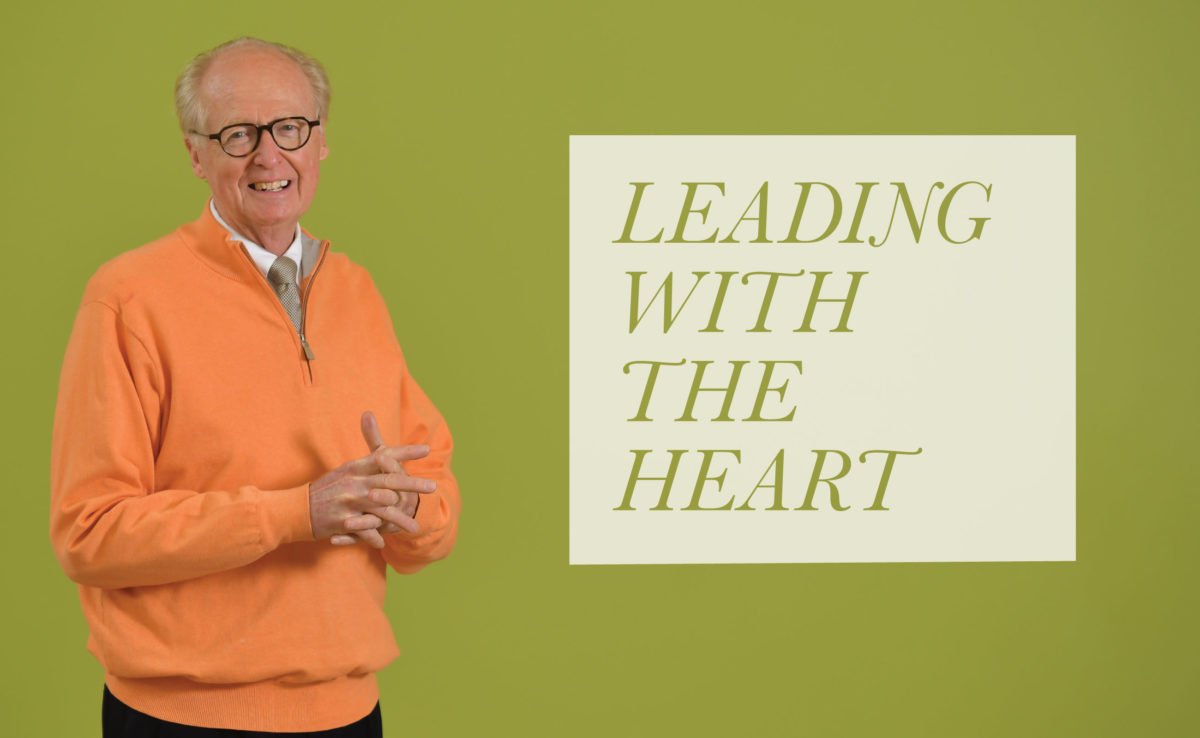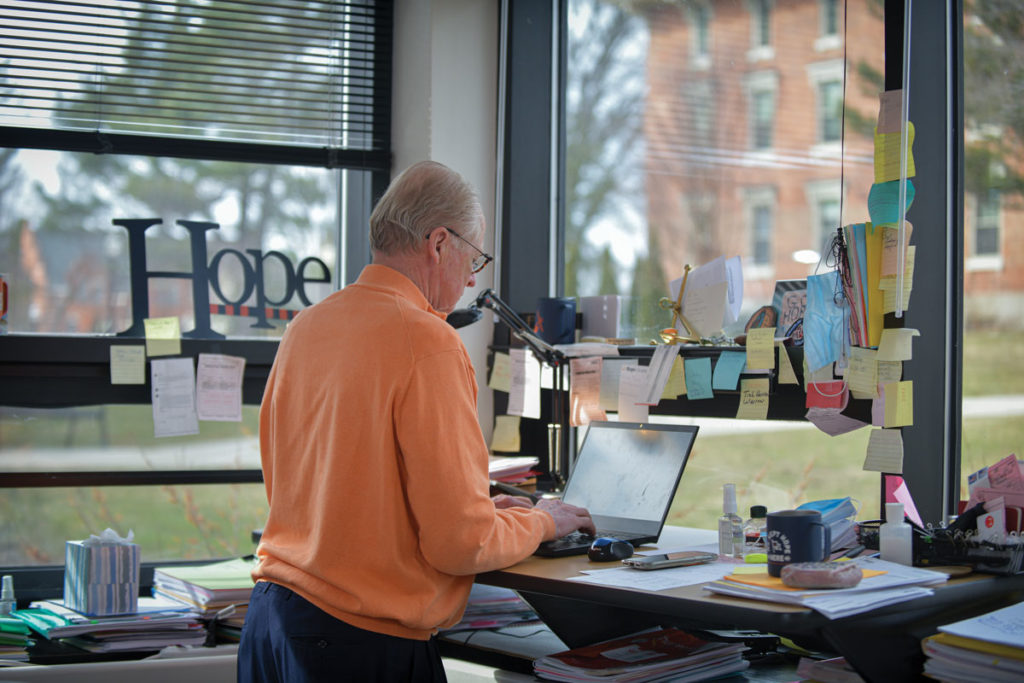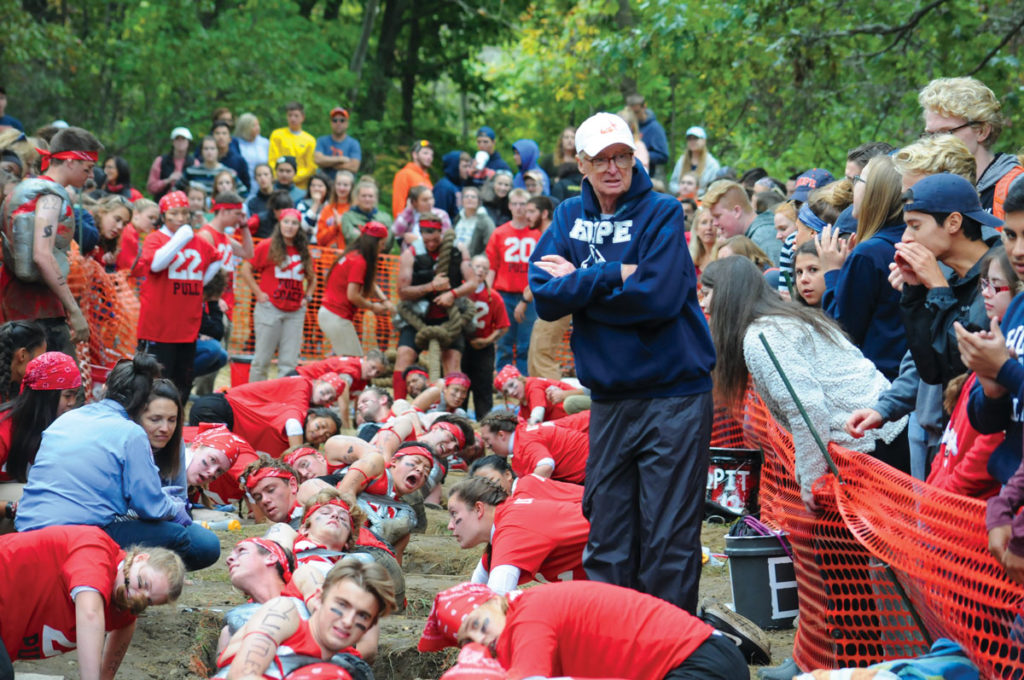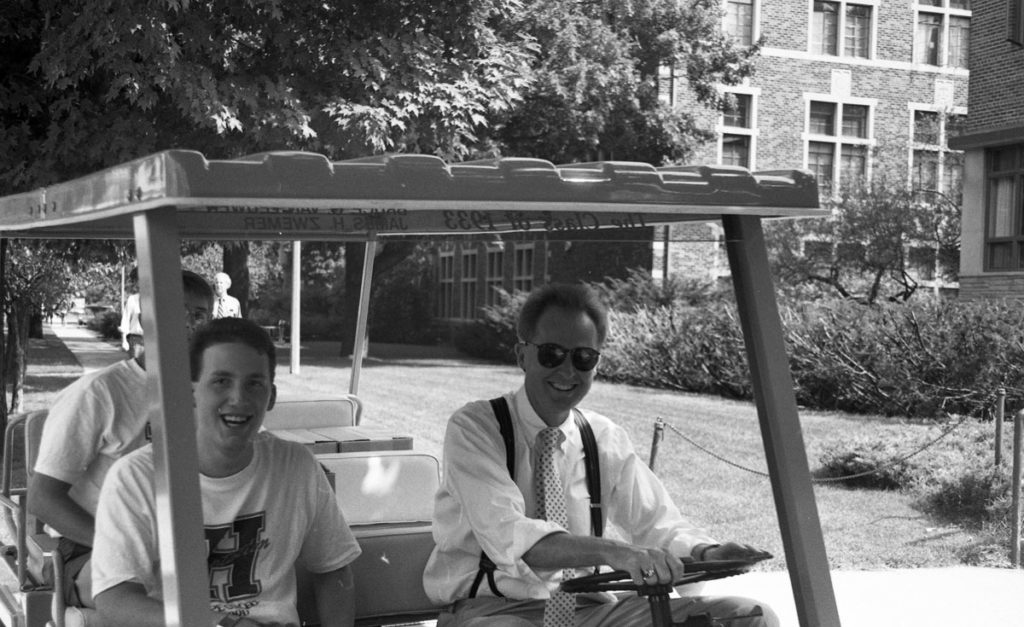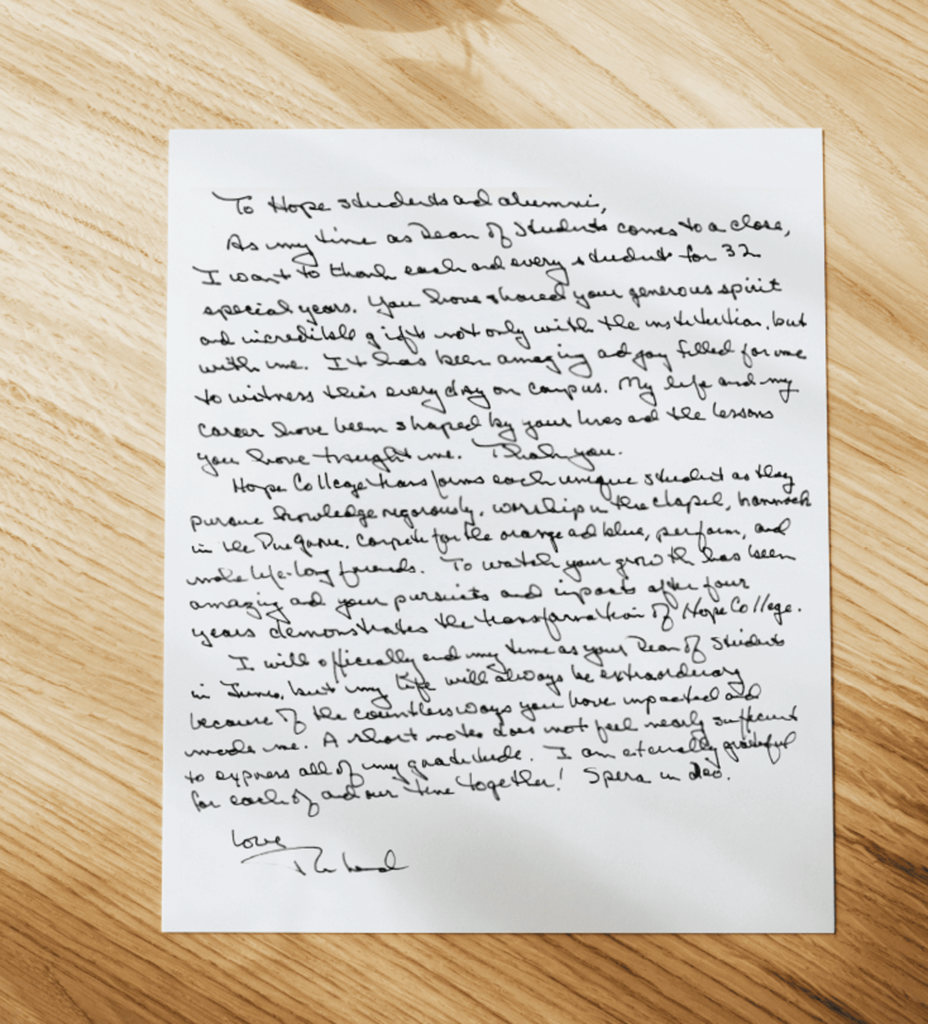Leading with the Heart
A member of the Hope College Board of Trustees invited Dr. Richard Frost, retiring dean of students and vice president for student development, to lunch. He wanted to get Frost’s view on how the student body was faring, particularly as they weather the pandemic, and perhaps gain some insights to the qualities needed for the successor to the position he’s held since 1989.
Rather than go off campus, the trustee suggested they eat in Phelps Dining Hall.
Huge mistake.
“Bad idea if I wanted his attention,” the trustee recalls. “Not only did every student there appear to recognize him, but he seemed to know every one of them by name. Every one of them. An amazing commitment to the students of Hope.”
“Amazing” and “commitment” are sublime adjectives to describe the decades Frost has given to Hope and its students, a connection he may continue beyond retirement by working on special projects for President Matt Scogin ’02 and the Alumni and Family Engagement office.
Retirement is, of course, a time for reflection. When Frost reflects, however, he is far less prone to detail his own achievements than to celebrate the impact thousands of Hope students have had on his life and career.
“I’m blessed,” he declares, sitting in his office one recent sunny afternoon. “I think what’s happening on our campus is really remarkable. I think our students are remarkable. Sometimes I’m not sure we deserve them. I’m in those contemplative places right now, but we all have to remember these are young people in the process of becoming. Let’s not forget where we were, and who we were, back then. That’s important.”
His office is adorned with photos of his family. There’s his wife, Sue, who once worked alongside him in Residential Life and Greek Life at Hope, went on to become director of residential life and housing at Western Michigan University, and today uses her LPN background as practice manager for Holland Community Health Clinic. “Without Sue I would not have been able to do anything,” he says. “She’s pulled my chops out of the fire on more than one occasion.” There are daughters Megan and Danae, who both graduated from Hope, and son Peter, who attended before transferring to Kenyon College. “Being the son of the dean is not an easy thing to do,” Frost reflects.
However, there are easily as many photos of his “second family”: undergraduates who have had a profound effect on him. Every picture tells a story, and memories gush forth as he speaks: some joyous (weddings, births, students who found their life’s calling at Hope); some, like his visits to hospitals, jails and mortuaries, make tears well in his eyes.
He was named a vice president in 1997, with expanded duties including oversight of:
- Residential education and housing
- Student Life
- Greek Life
- Dining
- Disabled student services
- Orientation
- The Boerigter Center for Calling and Career
- Counseling and Psychological Services (CAPS)
- Health Center
- Student judicial affairs
Despite the incalculable loss of institutional knowledge that comes with his departure, you’d be hard-pressed to find anyone at Hope who, in contrast, hasn’t been even more extensively inspired by Frost’s remarkable connection with students.
“My experience with Richard is that he leads with his heart,” says Sara Dorer, Hope’s senior director of equity and compliance. (Did we mention he also once served as Hope’s Title IX coordinator?) “Every student matters to him, and he pours his love into the way he advocates for the student voice when they aren’t at the table.”
Or even when they are, notes senior Luke Rufenacht, president of the Hope College Student Congress. He says Frost consulted with him for an hour every week about the pulse of the campus, but their relationship ran even deeper than that.
“My experience with Richard is that he leads with his heart. Every student matters to him, and he pours his love into the way he advocates for the student voice when they aren’t at the table.”
“We meet unofficially three, four, five times every single week,” says Rufenacht, a political science and business major from Quincy, Michigan. “And he comes to our Congress Executive Team meetings. That’s another hour and a half. So, yeah, I meet with Dean Frost all the time.”
Even with all that contact, “The thing that’s always stood out to me about Dean Frost is that he’s truly a student advocate,” Rufenacht says. “He knows where we need to go and who we need to talk to, but he has never imposed himself over a decision or forced his way in. He’s a really great connector, a greater advisor and definitely a mentor.”
Though he doesn’t say so directly, Frost intimates his compassion may have been fueled during the years he lived in Nigeria — at about the age of Hope undergraduates. “My father was a contractor for USAID and we lived in Suka,” he says. “I learned to drive there. But there were so many ugly Americans there, and that’s what I worry about for Hope. I don’t want us to become an ugly Hope.”
To that end, besides the creation of the Jim and Martie Bultman Student Center and its importance as a campus “living room,” Frost says one of the biggest changes he’s witnessed at Hope is the evolution of CAPS and the Health Center.
“I think CAPS has been fascinating,” Frost says. “I’ve been blessed trying to understand that piece, and the Health Center as well. One kid named Mike taught me a valuable lesson because he wanted to paint his room black. Of course that’s against the rules, but the reason he painted it black was because he had liver failure. His life at that time was black. We have to remember to walk with all students who have really difficult situations.”
He turns wistful. “There is a young man, James, who is just a stellar person. Amazing artist, bass player, anchor for his Pull team. Long story short, he became a quadriplegic. I spent a lot of time with him and one of the things he taught me is that in life, at certain times we have to put things in boxes and put them on our shelf, but they will always be a part of who we are.
“He said, ‘I still look at my bass even though I’ll never play it again, look at the artwork I can no longer do, but that doesn’t mean they aren’t a part of me.’ These 33 years will always be a part of who I am, but you have to look forward, not backwards. The teaching these students do, and have done for me all these years, is being placed in a box now. But I think the question is always, are we as adults willing to listen to them?”
To Hope students and alumni,
As my time as Dean of Students comes to a close, I want to thank each and every student for 32 special years. You have shared your generous spirit and incredible gifts not only with the institution, but with me. It has been amazing and joy filled for me to witness this every day on campus. My life and my career have been shaped by your lives and the lessons you have taught me. Thank you.
Hope College transforms each unique student as they pursue knowledge rigorously, worship in the Chapel, hammock in the Pine Grove, compete for the orange and blue, perform, and make life-long friends. To watch your growth has been amazing and your pursuits and impact after four years demonstrates the transformation of Hope College.
I will officially end my time as your Dean of Students in June, but my life will always be extraordinary because of the countless ways you have impacted and made me. A short note does not feel nearly sufficient to express all of my gratitude. I am eternally grateful for each of you and our time together. Spera in Deo!
Love,
Richard

